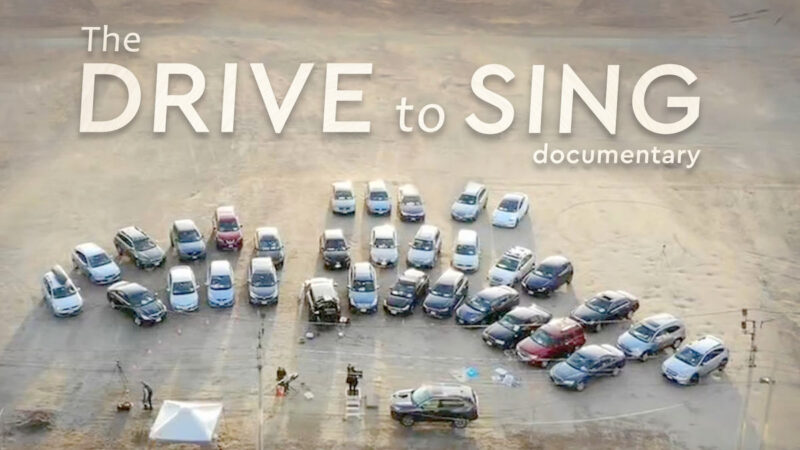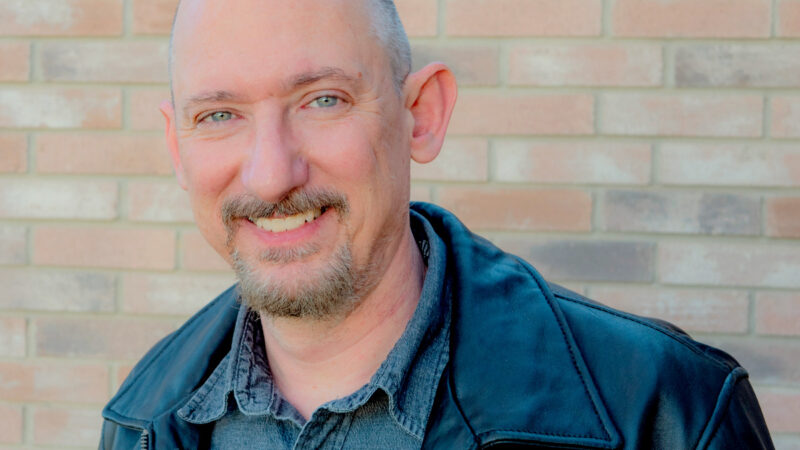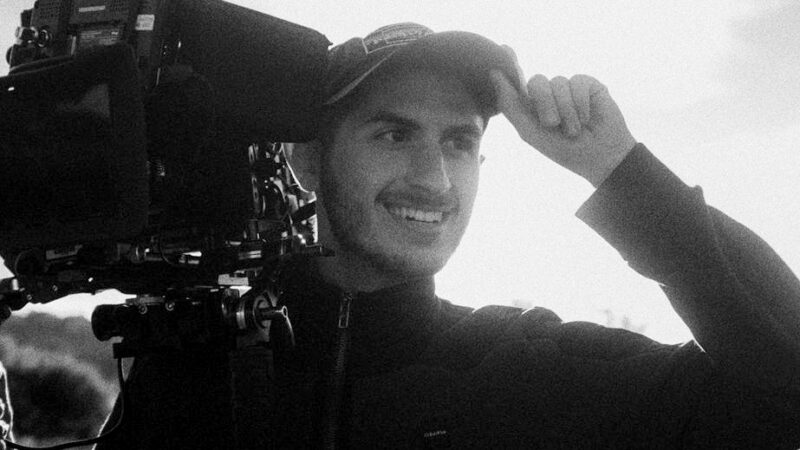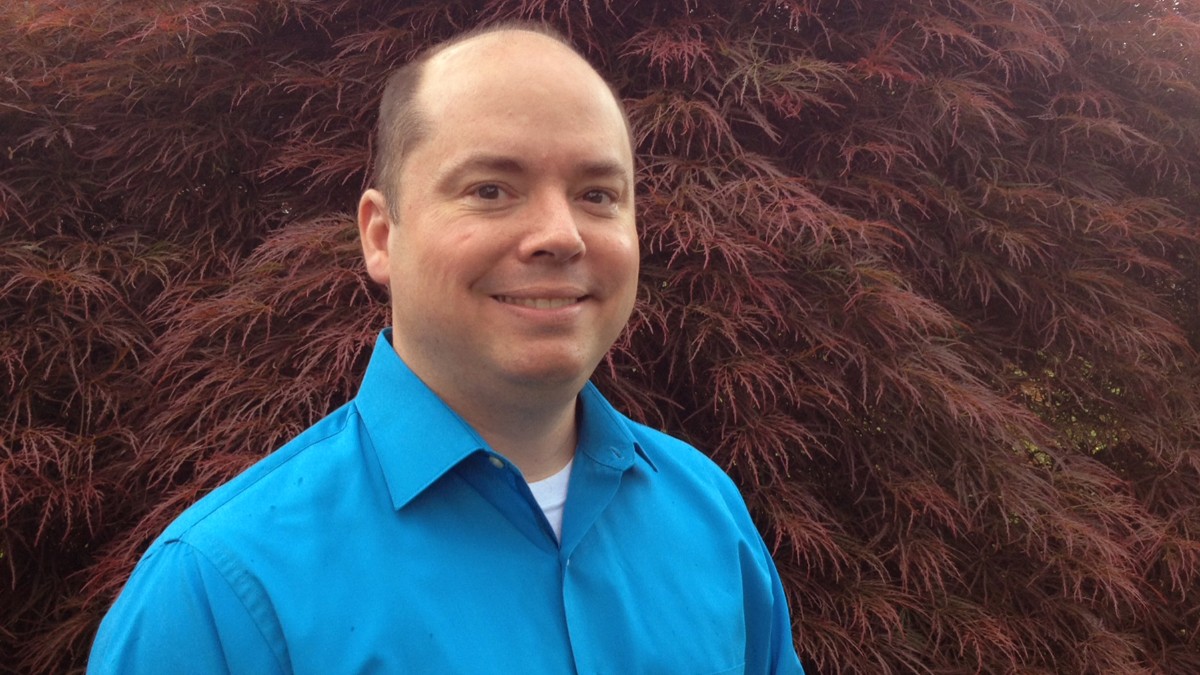
A Case Study
Narrative | Dramatic Features
Film Name: Made in Chinatown by Mark Wiley
Genre: Action, Comedy
Date: Principal Photography wrapped Aug. 2018. Post-production, Dec. 2020.
Director: Robert J. Samuels, James Lew
Producer: Mark Wiley, Shing Ka, Gine Lui
Writer: Mark Wiley
Cinematographer: Derrick Barry
Production Company: Tambuli Media, 9 East Productions, and Suza-Mark Productions.
Budget: $1.2 million
Financing: 9 East Productions
Production: 22 Days
Shooting Format: Red Dragon 4k
Screening Format: Vimeo Link w/ Password
World Premiere: It premiered (in first assembly) as the closing film of the 2019 Newark International Film Festival
Website: www.madeInchinatownmovie.com
indieactivity: What is your film about?
Mark Wiley (MW): Made in Chinatown is an action and comedy film. It follows a Chinese guy named Vincent “Vinny” Chow. Vinny attempts to join the Italian Mafia to get the interest of an Italian girl who only dates wiseguys. He unknowingly ignites a turf war between Italian and Chinese crime syndicates. He relies on his alter egos, (a pair of unlikely sages) to find his way through the mess he has created.
The idea for the story came to me (Mark Wiley) while visiting New York’s Chinatown. I tried to enter a “members only” kung-fu club and was turned away. Later I walked across Canal Street from Chinatown into Little Italy. I considered what would happen if a Chinese guy tried to join the Italian “members only” club, like the Mafia. With New York’s Chinatown and Little Italy neighborhoods facing one another, I knew the idea had potential.
Trailer for Made in Chinatown written by Mark Wiley, directed by Robert J. Samuels, James Lew
Tell us about the festival run, marketing, and sales?
Mark Wiley (MW): I started a Facebook page and a website before production. I wanted to create a buzz for the film. Each new development was added to both, and the project began gaining followers. We got several podcasters and YouTubers to the set. They met Jay Kwon took behind-the-scenes pics and videos. They did interviews with the cast to share the content on their platforms. We then shared their posts on our two official platforms to create more awareness and buzz. We completed a rough cut from the buzz, once production closed and were invited to screen at several festivals.
At the Newark International Film Festival, I gave a filmed writer/producer interview, we did a Panel Discussion with our cast and Made in Chinatown screened as the closing film of the weeklong event. We received a standing ovation so loud that you could not hear the song over the end credits. Vincent Pastore (who plays Brooklyn Mob Boss Condimento) won “Best Actor” and Jay Kwon (who plays the lead protagonist “Vinny” Chow) won “Best Stunts” for his martial arts. It screened at Freedom Festival International, where Jay Kwon won “Best Actor,” and the film won “Audience Choice,” and “Best Action.”
Hell’s Kitchen New York City Film Festival was next, where Tony Darrow (who plays Manhattan mob boss Al Capella) won the Argo Award for Lifetime Achievement in film. We finished our run as an “Official Selection” and at the Philadelphia Independent Film Festival. Interestingly, Made in Chinatown was not selected for the Philadelphia Asian American Film Festival, even though 50% of the cast is Asian and the film was shot in Philadelphia! You never know how things are received.
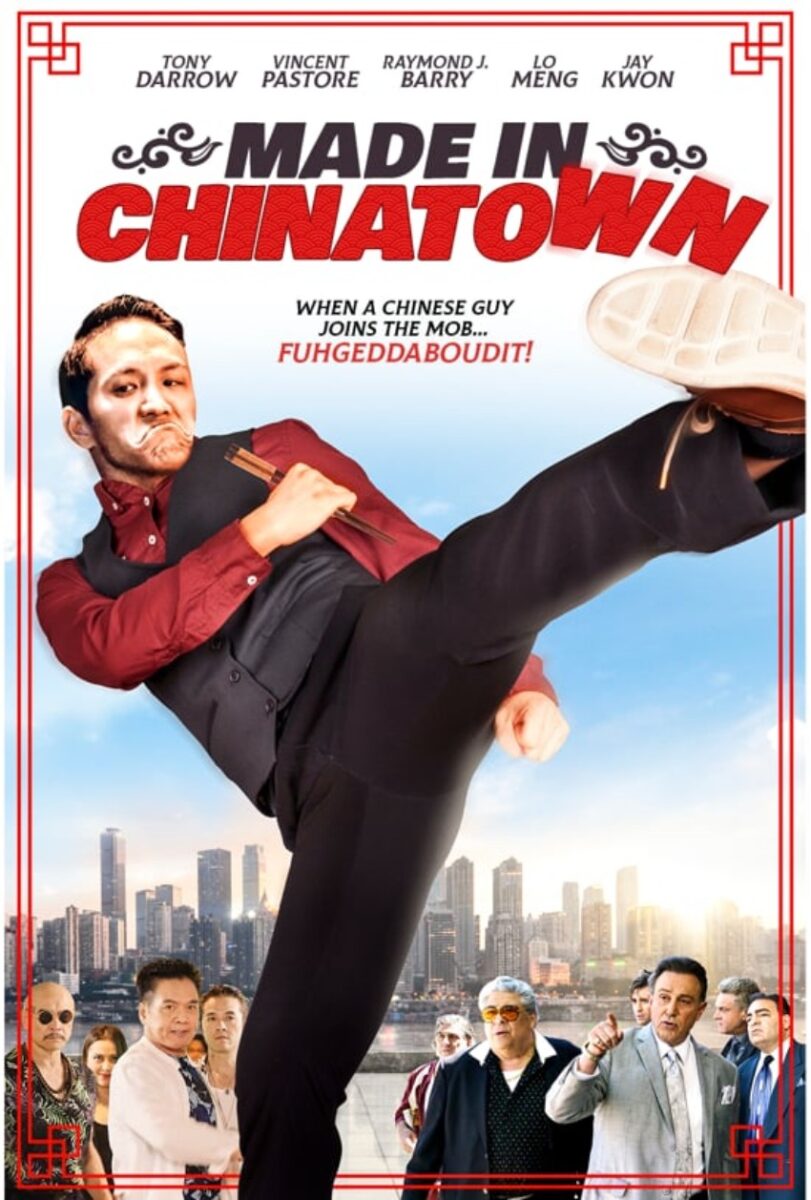
About 18 months passed between the festival run and completing postproduction and passing QC. Several reasons made this. The first was: we ran out of funding and had to “beg, borrow and charge it” to the end. You know, all the basic no-funds nightmares that occur on indie productions! However, during that time, we were able to get many of our actors on podcasts and interviewed about the film. Most of the time we had multiple actors on the video podcasts together, laughing and sharing stories with the hosts. We threw a “watch party” with Urban Action Showcase Cinema. At the event, about 6 cast members, producers, and directors talked about the film. This happened before a paid screening over zoom, followed by an audience Q&A session.
We next hired a sales company that claimed to have presented the film to dozens of networks, streaming platforms, and studios for distribution. They came up with only one offer. We then switched to work with Alex Nohe of Blood Sweat and Honey, and he was able to get us a handful of solid distribution offers within a few weeks! After reviewing the offers we decided to go with Vision Films.
Vision worked with us on PR and social media marketing, prior to our initial TVOD (pay per view) window where we were available for streaming on some 30 platforms. We were able to garner about a dozen good reviews and press for the film. I also used my contacts for some magazines and online coverage. And we partnered with a Chinese newspaper and food delivery company (this is all COVID time) and marketed a “Dinner and a Movie” night where people could pay to receive take-out Chinese food, chat with our cast, director, and writer, and then stream the film. Then we partnered with the Chinese Culture Center and the Chinese Benevolent Association of New York, to “re-open” Chinatown from COVID, with an official “Made in Chinatown Day.”
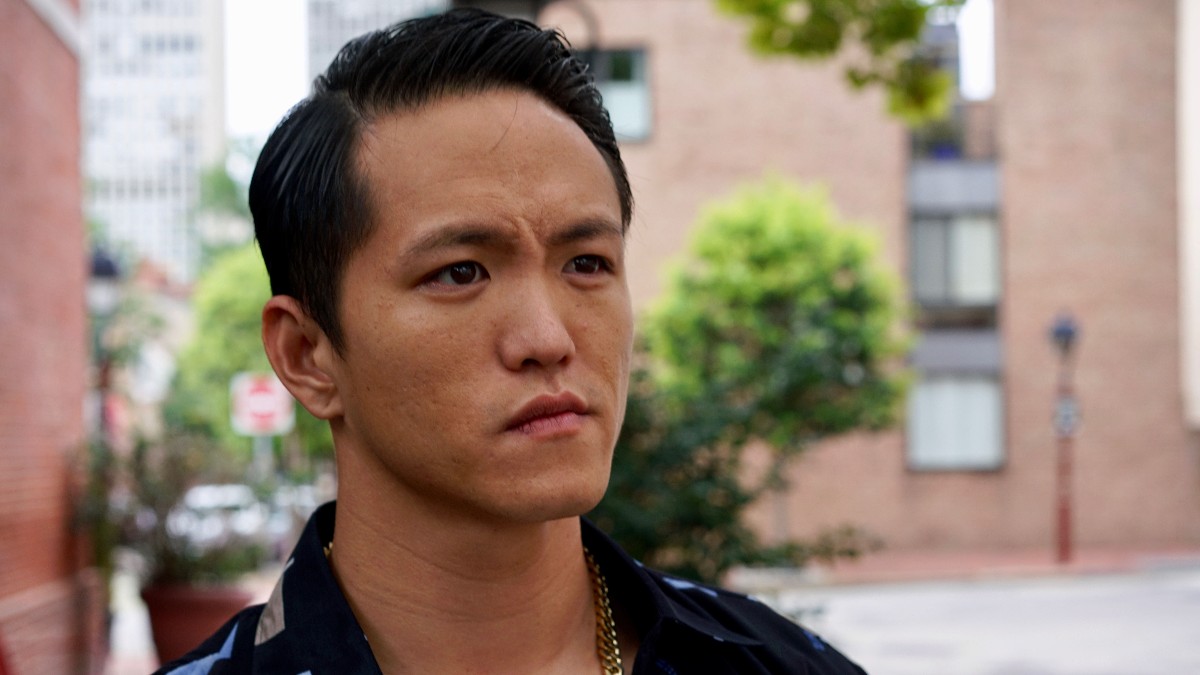
There was a lion dance parade, kung fu demonstrations, photo ops with our cast and the Chinese community leaders, and a big press conference. Finally, Made in Chinatown was included in the “Sword and Fist” archive at the Museum of the Moving Images in Astoria, Queens, wherein they had demos, a screening, and Q&A with our cast afterward. The event was live-streamed on Facebook and shown on local access television. Last month we were picked up by Amazon Prime, and we are now looking for ways to increase viewership and reviews on Prime and IMDb, to help us find broader distribution and international release. It’s difficult for an indie film to get noticed, but we keep pushing and welcome your advice and help, too!
Give the full Official Synopsis for your film?
Mark Wiley (MW): It’s Mickey Blue Eyes meets Big Trouble in Little China when a young Chinese nobody sets out to become a “made guy” in the Italian Mafia. But tensions are already high between the two cultures as they move into each other’s turf while a dirty crime commissioner is playing all sides. It turns out that earning respect, finding love, and discovering his identity doesn’t come so easy. He’ll have to fight his way to the top.
In New York City, Canal Street divides Little Italy and Chinatown, and a bridge separates Manhattan from Brooklyn. But this doesn’t stop a turf war from erupting among Italian and Chinese organized crime syndicates. Mob bosses Al Capella (Tony Darrow: Goodfellas), Amadore Condimento (Vincent Pastore: The Sopranos), and Hung Phat (Lo Meng: Five Deadly Venoms), control the oils, herbs, and spices in Little Italy and Chinatown. It’s the oldest crime syndicate, begun centuries ago by Marco Polo.
Despite being Chinese, Vincent “Vinny” Chow (Jay Kwon: Shang Chi) embarks on a personal quest to join the Italian Mafia to attract the Italian girl of his dreams. In his hilarious attempts to prove himself mob-worthy, Vinny is drawn into a series of double-crosses instigated by New York’s dirty crime commissioner Sean O’Greedy (Raymond J. Barry: Walk Hard), who is playing all the mob bosses against one another.
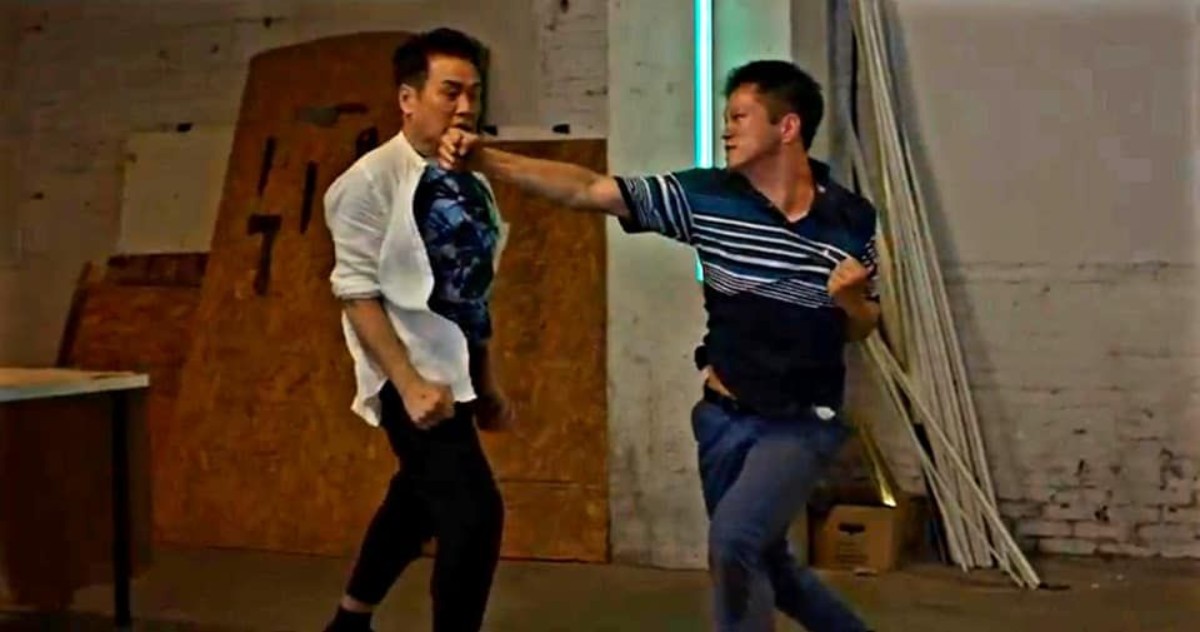
Along with his Italian friend Joey Risotto (Timothy Chivalette: Glass) and gay Black friend Lawrence (Manny Brown: Spider-Man on Broadway), Vinny is recruited by “The Two Johnsons” to impersonate the Italian DON and infiltrate the Mafia to gather evidence that will take down New York’s crime syndicates once and for all. With a little help from two unlikely sages, “Wisdom” (Shing Ka: The Manchurian Candidate) and “Knowledge” (Geoff Lee: Revenge of the Green Dragons), “Vinny” finds himself, his Chinese culture, and his true love (Shuya Chang: Sneakhead).
The Chinatown-meets-Little-Italy comedy sensitively handles, with more satire than spoof, the timely Asian immigrant experience, as well as racial stereotyping and labeling. Co-directed by Robert J. Samuels (My Asian Auntie) and EMMY winner James Lew (Marvel’s Luke Cage) and written and produced by Mark V. Wiley (Martial Arts Hall of Fame), Made in Chinatown is the world’s first-ever Mafia Kung-fu Comedy. The title Made in Chinatown is a play on the phrase “Made in China” and the Italian Mafia’s notion of being a “made guy.” And so, Vinny Chow literally is “Made” in Chinatown.
Development & Financing?
Mark Wiley (MW): After coming up with the premise of a Chinese guy joining the Italian Mob, I had the idea to write this as a thriller. The Chinese guy is admitted into the mob but used to infiltrate Chinatown and extort its businesses, eventually including his own fathers. But soon I realized this take on it was too dark and would be better served as a comedy, where satire and spoof could be used as a vehicle to deflate cultural stereotypes.
Although I am a well-published non-fiction writer, I did not know how to write a screenplay, so I purchased tons of books on the topic and read them cover to cover. I then began writing the funniest scenes I could think of, forgetting everything I just read in the books about plot, subplot, theme, character arcs, act breaks, etc. But I soon realized 50 funny scenes do not make a story or a film, so I went back to the notes on story structure and character development outlined the story into plot points, and finally had a draft.
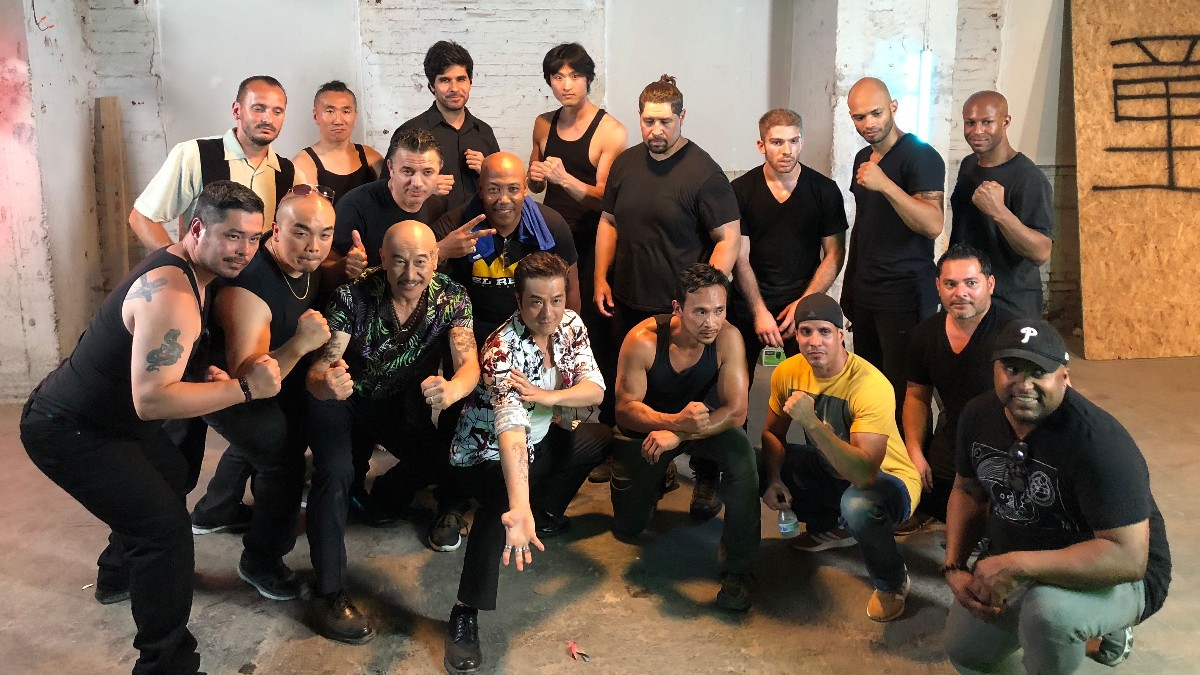
After a few weeks, I returned to it fresh after watching a bunch of films in the genre and wrote another draft. I then sent that draft to two different coverage readers, who offered so much great feedback that I took about six months implementing their notes, discovering more things, and rewriting again and again. I next sent the new draft to friend writers for feedback, and they made more changes before sending it back for coverage again (there is a fee each time). It finally came back as a “recommend” with a few last notes.
Once I had a tight script, I reached out to several screenwriting agents, to no avail. I was told every time that they don’t accept new clients, or clients not recommended by others in the industry. So, I decided to send the script directly to producers on my own, including Ron Howard and Rob Reiner. Yes, they were returned unread (I hear you laughing). Options escaped me, I didn’t know what else to do, and several years passed trying to look up contacts on IMDb Pro and sending emails and making calls, all to no avail. I could not get anyone to look at the script or consider me for representation, despite having published a dozen books. I believed in the project and never gave up.
As years passed, I kept reviewing the story and rewriting things here and there. Finally, the tides turned. One night I decided to pay a visit to a friend who runs a Chinese tea shop to say hello. He asked me what I was working on, and I told him. He said from age thirteen he was raised in NY Chinatown and had to take the bus home from school, which dropped him in Little Italy, and he was always picked on. And he mentioned his unusual encounter with mob-like figures. He said the story resonated with him and that he knew some financiers in China who he thought would fund the project. We met again after that, reviewing the script together and he emailed it to his contact in China, who then started corresponding about the project and they were ready to fund it in the coming months.
The timing was on my side, as now that funding was coming through, I happened to see a friend of a friend, Shing Ka, had posted a photo of himself on Facebook with some actors he was working with on set as a producer, that I wanted to cast in my film. I messaged him and he agreed to speak with them, they liked the story and asked me to have a casting agent send the script to their agents. I didn’t know a casting agent, so Shing introduced me to Caroline Sinclair, and from there we had scripts out to agents and actors. We locked the shoot dates, set the dates (day of days) for the actors, hired our production team (more on this later), and rented our production office.
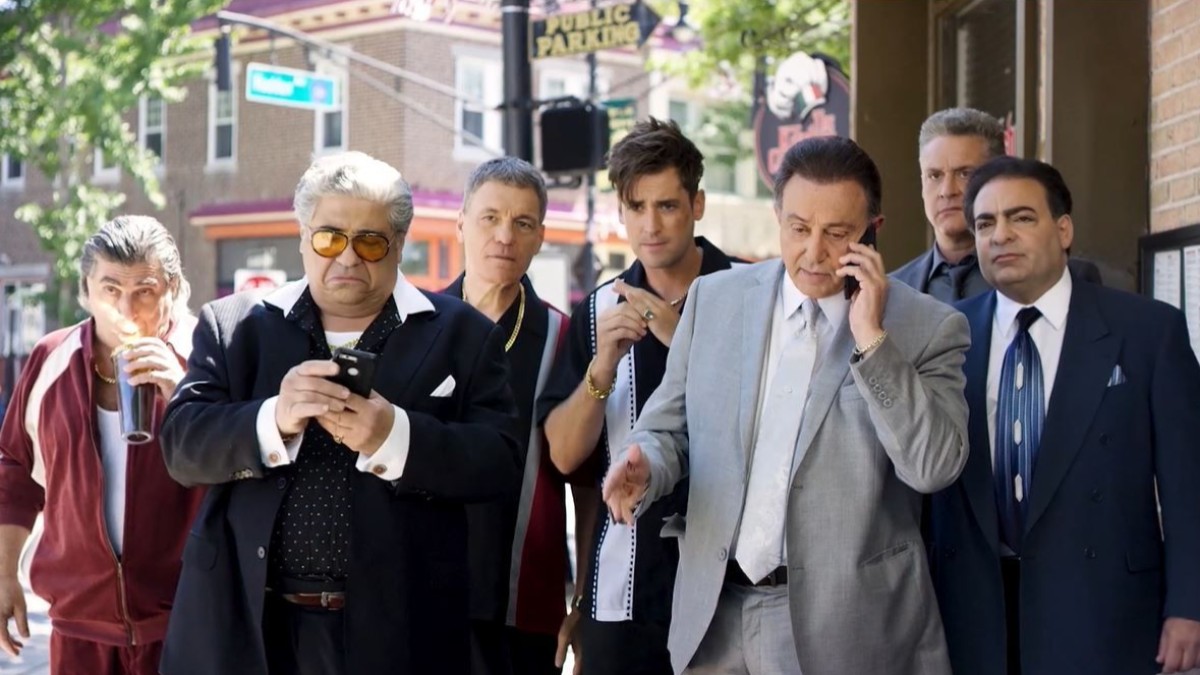
Everything was in motion. And then… our former president began relentlessly tweeting about a trade war with China. The result: the Chinese government closed all outgoing new investments to America. I was unable to receive the funding, even though the investor placed the bank transfer. Now timing was not on my side. What to do?
Well, I had to do something so I made a list of everyone I knew who had money, worked for someone who had money, was an investor or an entrepreneur, and asked them to look at the film’s EPK and investment terms and to pass that along to anyone they thought might be interested in considering such an investment. Again, the timing was on my side when a former co-worker from a decade ago messaged me on Facebook to congratulate me on getting the project going, as he had seen the first draft back in the day.
I called him and we laughed, and I told him how I got tractions and how the first actor liked it so much he called all his friends to be in the film, too, etc. And then I told him how the funds had been blocked and I was not having luck raising new funds and he said he might know some people. Sure enough, he and I were able to pull a group of investors together to fund 60% of the original film budget. We rolled into production, cutting some scenes, and combining others to conserve funds while reaching more investors.
Production?
Mark Wiley (MW): I began martial arts at age nine and when I was 12, poorly-dubbed Hong Kong kung-fu movies showed on television on the weekends. One of my favorite stars was Lo Meng and he was in so many films. I dreamed of meeting him one day. Jump ahead several decades and I find he has several Facebook profiles. I private message them and one responds. I ask if I am messaging Lo Meng, and he says, No I am his manager in the US. He told me his name and it turns out that Bobby Samuels and I live in the same area and that he had worked in the Hong Kong film industry for a decade. I told him about my film and how I’d like to offer a role to Lo Meng, and we set up a time to discuss it in person.
Bobby was in the middle of shooting a short film and needed some additional funding and props. I was in a position where I could help and that is how I received my first producer’s credit. I also went to set and saw how things worked and met more people. The film showed at the Urban Action Showcase festival on Times Square in NY and won several awards. It was there I met so many more people in the industry and told plenty of people about my project and momentum started to build.
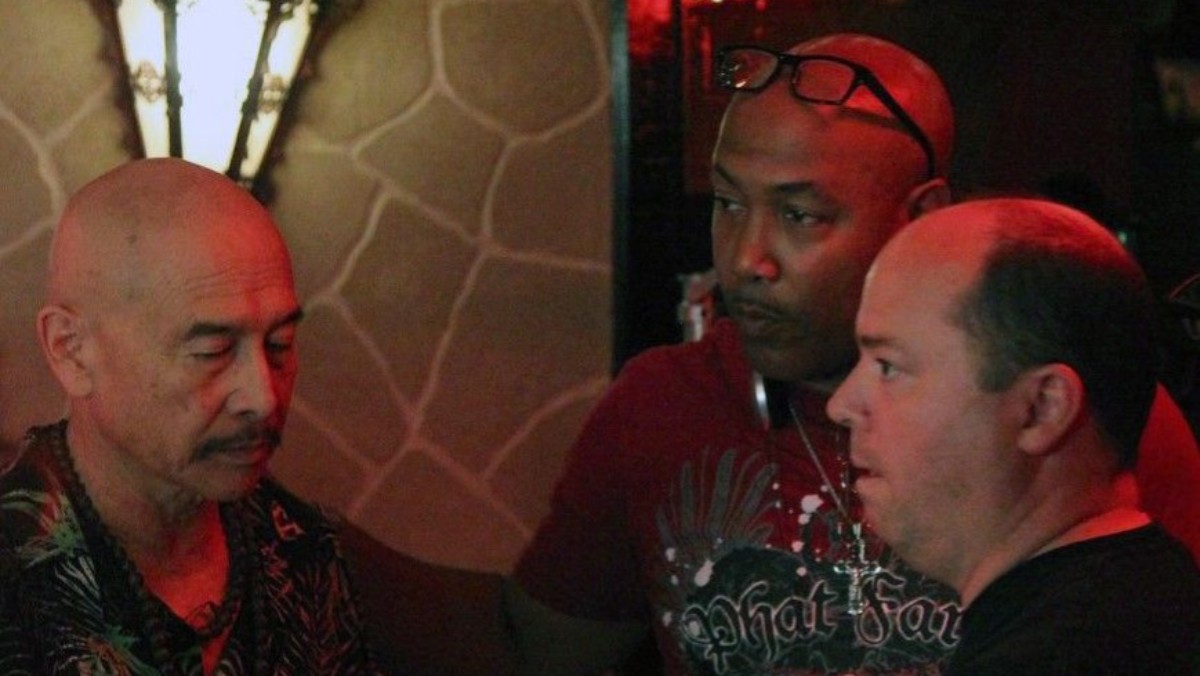
Bobby then set up a meeting with a producer’s team he had worked with in the past and we discussed the project and how to fill the key positions. From this meeting, we were able to solidify the line producer, production manager, production supervisor, and soon after the first AD. Oh, and Lo Meng read the script and agreed to do the film!
We opened our production office six weeks prior to the first day of principal photography. The producer’s team, director, and cinematographer began preproduction work. Time was spent scouting locations, negotiating deals for use of space, working with the Philadelphia Film Office, the streets and parks departments to secure permits to close roads or block alleys, etc. We also did most of our casting during this time, via agents and managers for the main roles, and then held a local casting call to fill the remainders.
A local background casting company for our casting needs, we hired our caterer, got insurances together, working on sponsorships, got production accountants on set, and signed our SAG-AFTRA signatory papers. This time was also spent on wardrobe, props, set design, renting equipment, finding holding locations near prospective sets. Next, our stunt coordinator began work with our lead and the stunt team to work out the action sequences. It was a very busy time!
The main hurdle was scheduling. There were far too many sets of actors in the film, representing the Chinese guy’s family and friends, the Manhattan mob crew, the Brooklyn mob crew, and the Chinatown Triad boss and his men. Sometimes their scenes were together and sometimes separate. But for costs and time, all scenes in one location had to be filmed in a single day, or sometimes a second day at a location was required. Some of the more well-known actors had other projects and were not flexible with their availability. And because of this we sometimes had to pay actors to sit on set all day waiting for their scene.
Keeping track of days and costs per scene was difficult. And as funding flew out here and there, I had to make concessions by rewriting bigger scenes into smaller ones, combining scenes, or just tossing some scenes out completely. The funniest scene in the entire film was never even shot. Its plot points were combined with another scene that didn’t come out well and was cut, meaning missing plot points and actors and crew paid for work that wasn’t used.

The film was shot over 22 days. Although it is set in New York’s Chinatown and Little Italy, 19 days were shot in various Philadelphia Chinatown, Italian Market, and South Philadelphia locations. One day was shot at a restaurant in Collingswood, New Jersey. And two days of exteriors were shot in New York.
During the weeks of production, I worked tirelessly to raise more money to complete the film, had potential investors to the set many times, was given promises, but in the end, no additional funds came through to complete the project. We could squeak past production, but there was nothing left for post-production. It was impossible not to complete the project or be sued by the investors. Plus, we had tons of great footage. I went out to more investors, and one day got an unsolicited email from an infamous Hollywood producer who said she could have the film edited, sound designed, color corrected, and QC’d for X amount, and then would take it out for direct sales to Sony, Paramount, and the like.
What a break. My wife and I took money from our retirement and paid the sum and after the producer sent us the first assembly, she claimed she needed more money or could not do more work. We were scammed. I called my lawyer who advised it would cost too much to sue, and too long to get the funds back and to move on. It took another 18 months and three more sets of editors, at “friend” prices paid on credit cards and by taking out loans, to get a final assembly and music that was good.
Two issues occurred with voiceovers during production. An initial voice-over was recorded in the hotel room of the main character, for which I was not present. Because the co-director did not understand the film was satire, he recorded it seriously to mimic Ray Liota’s opening VO in Goodfellas. Additionally, much of the dialogue at the end of one scene was to be a VO into the next scene to provide a style of continuity. However, when the pages were printed for a given day based on location, the dialogues were not included. Why? Because whoever was responsible did not read the script before disassembling it; if they had, they would have seen the VO continue into the next scene, noted it, and shot that VO while shooting the actual scene.
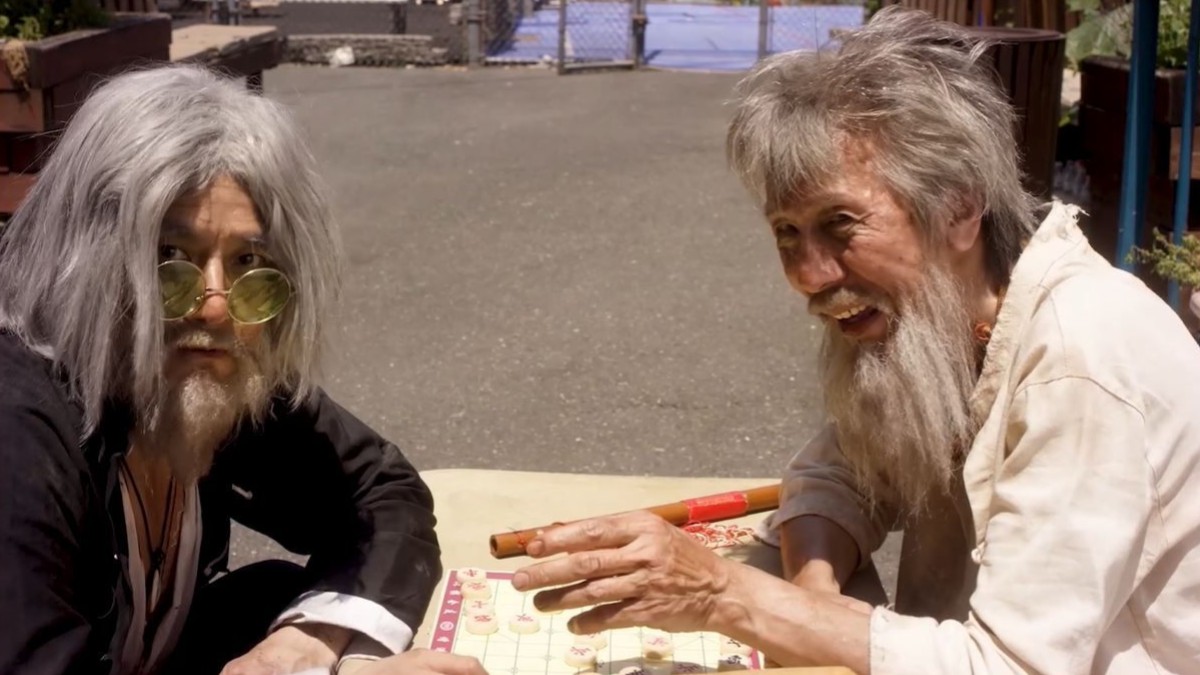
I knew none of this until the first assembly was completed! Worse, because of the on-set rewrites, and scenes that were not shot well, the story did not unfold correctly. So, I had to watch the assembly several times to get a handle on it and then write a new voice-over to tie it together. The lead character then went into a studio and recorded the new VO, and I had the two Sages record their missing lines on their cell phones because there was no cash for another studio session. Thankfully, it turned out ok in the end!
The decision was made for each “group” within the film to have their own music, as a theme, and was lucky to have a talented musician friend of mine write and record those tracks. I placed music in almost every scene and used original music for most of the film. I think I may have purchased licenses for five or six royalty-free tunes. We were now ready to find a distributor.
Festival Preparation & Strategy?
Mark Wiley (MW): It was during postproduction that we showed the film at several festivals (see above). Now that we had a solid final edit and several festival awards, we were ready to move on to find distribution.
The Release?
Mark Wiley (MW): I went out and investigated sales agents and selected one that marketed itself as a “top 10 sales agency” in the field. I reviewed their Press Kit and spoke with the head and paid their fee. They claimed to have presented the film to 22 networks, streaming platforms, and studios for distribution. But after about six or eight weeks they said everyone rejected our project except for one company. I was discouraged, but I did not think it was real. So, I asked for copies of emails sent and rejections received but was given none as proof. Scammed again!
I ditched that company and somehow found more money to pay another agent, Alex Nohe, whom I had previously spoken with about the project. He suggested we re-do the poster and EPK and then he would present it to distributors. We did a poster competition on 99Designs, picked a winner, redid the EPK. He did and within a few weeks, we had five solid offers on the table!
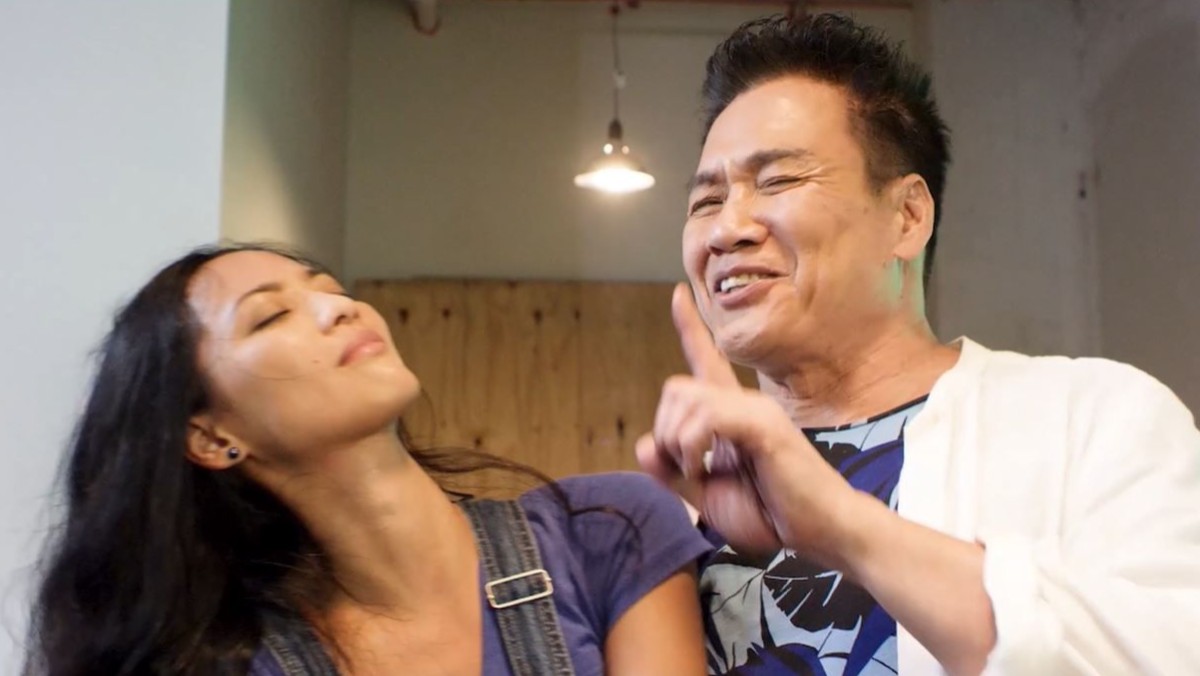
I ended up selecting Vision Films as our distributor after having several discussions with its CEO Lise Romanoff and VP of Marketing, Kristen Bedo, and I appreciate all they do for the project to this day. It was so hard getting all the required releases and contracts together for them. And then I sent the trailers over which we had made and been promoting on social media for months. Turns out, we failed QC miserably! While the final assembly was good, the sound and color were awful, they said, along with some framing issues, etc. I thought the film looked and sounded great. But they said if we don’t pass QC, they can’t distribute the film; the platforms would reject it.
So, I had to open more credit cards and take another bank loan to take the film files to a proper postproduction house to clean the sound. It took three weeks and after sitting with the sound designer for a few days, I was stunned at the difference. Clean sound, clean mics, new ambiance, leveled music and dialogue, new sound effects. Amazing! We finally passed QC and Vision released Made in Chinatown in North America on March 11, 2021, on pay-per-view platforms like iTunes, Google Play, Vudu, Xfinity. And in late November 2021, it finally made it to Amazon Prime.
Being an indie film, it is very difficult to get traction on platforms that promote large studio films. These companies buy the ad space, the placement of their ‘posters’ in the new release section, and run their trailers. It is too expensive for us to find a way ‘up front’ so people can know the film is available. I continue to work hard and find ways to expand awareness of my passion project, to get more press, more clicks on Prime, and more reviews on Prime and IMDb to help the film expand its distribution and hopefully make it into the international market. Relaying my 20-year struggle to make the film with you here, is one of these ways. Please check out Made in Chinatown and leave a positive review!
Advice from Mark Wiley?
Mark Wiley (MW): As you can see from the above, I made a ton of mistakes and was scammed on occasion, too. But I didn’t share everything because it would take a book! However, I gained a lifetime of experience in a single production, and I have some solid advice to share. The first of which is to follow your dreams and never give them up, even when people tell you otherwise. It took me 20 years to make my film and it is a major accomplishment, even if the film didn’t end up like the script I wrote. Add to this that no one cares more about your project than you, so don’t expect others to put forth the same effort or be as committed to seeing it through.
With social media and virtual and in-person events, meeting people in the industry is easier than ever. Join social groups, attend meetings, meet people, and network. Try to work on someone else’s project, even for free, to learn the ropes and forge relationships you’ll need when your film is ready to go.
When your project is ready for production, be sure the vet all the key people you will need to rely on: line producer, production supervisor, production manager, location scout, first AD, etc. Hire a reputable accounting firm to watch the books and an entertainment attorney to look over agreements. Make sure that whomever you hire to direct and shoot your film, has read the script and is on board with your vision; not scrap yours for their own ideas. And if they have their own ideas, which may be amazing, be open-minded to hearing them and reworking the project for the best result. Follow SAG rules if the project is to be a SAG project.
Start creating buzz for the project early on, with at least a social media presence, and build awareness of it. Make sure the dailies are reviewed every day in case a mic was turned off or something was not captured right. Make sure the script supervisor reads the entire script before separating pages for specific scene shoots and sending sides to the actors. Avoid a top-heavy cast. As an indie film, all you really need is one, maybe two, recognizable cast members in lead roles. I had too many, and this also stressed the budget. Having more than one does not change the sales value of the film.
Never count on promises of future funding. What you have is what you have. So, do not start production until the full budget is in escrow!
Lather, rinse, repeat, and do it all again. Keep working and good luck!
Mark Wiley
Tell us what you think of the Case Study for Made in Chinatown by Mark Wiley. What do you think of it? Let’s have your comments below and/or on Facebook or Instagram! Or join me on Twitter.
Follow Mark Wiley on Social Media
Website
IMDb
Facebook
Instagram
Vimeo
MORE STORIES FOR YOU


